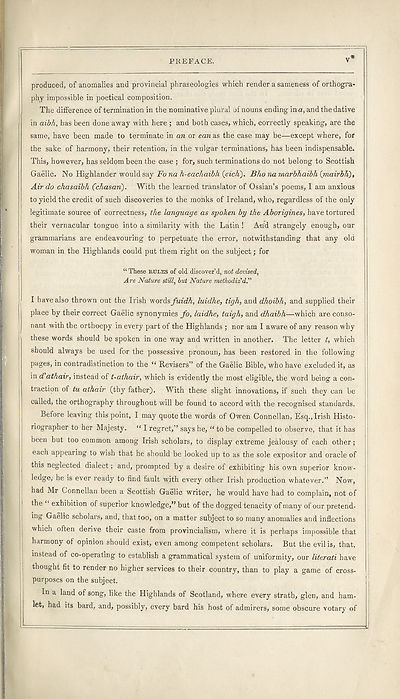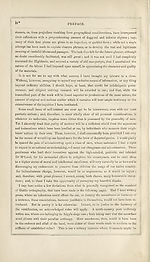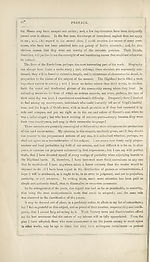Books and other items printed in Gaelic from 1871 to 1900 > Sar-obair nam bard Gaelach, or, The beauties of Gaelic poetry, and lives of the Highland bards
(11) Page v*
Download files
Complete book:
Individual page:
Thumbnail gallery: Grid view | List view

PREFACE.
produced, of anomalies and provincial phraseologies which render a sameness of orthogra¬
phy impossible in poetical composition.
The difference of termination in the nominative plural of nouns ending in a, and the dative
in aibh, has been done away with here ; and both cases, which, correctly speaking, are the
same, have been made to terminate in an or ean as the case may be—except where, for
the sake of harmony, their retention, in the vulgar terminations, has been indispensable.
This, however, has seldom been the case ; for, such terminations do not belong to Scottish
Gaelic. No Highlander would say Fo na h-eachaibh (cicfi). Bho na rnarbhaibh (mairbh),
Air do chasaibh (chasan). With the learned translator of Ossian’s poems, I am anxious
to yield the credit of such discoveries to the monks of Ireland, who, regardless of the only
legitimate source of correctness, the language as spoken by the Aborigines, have tortured
their vernacular tongue into a similarity with the Latin ! And strangely enough, our
grammarians are endeavouring to perpetuate the error, notwithstanding that any old
woman in the Highlands could put them right on the subject; for
“ These RULES of old discover’d, not devised,
Are Nature still, but Nature methodiz'd."
I have also thrown out the Irish words fuidh, luidhe, tigh, and dhoibh, and supplied their
place by their correct Gaelic synonymies fo, laidhe, taigh, and dhaibh—which are conso¬
nant with the orthoepy in every part of the Highlands ; nor am I aware of any reason why
these words should be spoken in one way and written in another. The letter t, which
should always be used for the possessive pronoun, has been restored in the following
pages, in contradistinction to the “ Revisers” of the Gaelic Bible, who have excluded it, as
in d athair, instead of t-athair, which is evidently the most eligible, the word being a con¬
traction of tu athair (thy father). With these slight innovations, if such they can be
called, the orthography throughout will be found to accord with the recognised standards.
Before leaving this point, I may quote the words of Owen Connellan, Esq., Irish Histo¬
riographer to her Majesty. “ I regret,” says he, “ to be compelled to observe, that it has
been but too common among Irish scholars, to display extreme jealousy of each other;
each appearing to wish that he should be looked up to as the sole expositor and oracle of
this neglected dialect; and, prompted by a desire of exhibiting his own superior know-
ledge* he is ever ready to find fault with every other Irish production whatever.” Now,
had Mr Gonnellan been a Scottish Gaelic writer, he would have had to complain, not of
the “ exhibition of superior knowledge,” but of the dogged tenacity of many of our pretend-
j ing Gaelic scholars, and, that too, on a matter subject to so many anomalies and inflections
j which often derive their caste from provincialism, where it is perhaps impossible that
| harmony of opinion should exist, even among competent scholars. But the evil is, that,
instead of co-operating to establish a grammatical system of uniformity, our literati have
thought fit to render no higher services to their country, than to play a game of cross¬
purposes on the subject.
In a land of song, like the Highlands of Scotland, where every strath, glen, and ham¬
let, had its bard, and, possibly, every bard his host of admirers, some obscure votary of
produced, of anomalies and provincial phraseologies which render a sameness of orthogra¬
phy impossible in poetical composition.
The difference of termination in the nominative plural of nouns ending in a, and the dative
in aibh, has been done away with here ; and both cases, which, correctly speaking, are the
same, have been made to terminate in an or ean as the case may be—except where, for
the sake of harmony, their retention, in the vulgar terminations, has been indispensable.
This, however, has seldom been the case ; for, such terminations do not belong to Scottish
Gaelic. No Highlander would say Fo na h-eachaibh (cicfi). Bho na rnarbhaibh (mairbh),
Air do chasaibh (chasan). With the learned translator of Ossian’s poems, I am anxious
to yield the credit of such discoveries to the monks of Ireland, who, regardless of the only
legitimate source of correctness, the language as spoken by the Aborigines, have tortured
their vernacular tongue into a similarity with the Latin ! And strangely enough, our
grammarians are endeavouring to perpetuate the error, notwithstanding that any old
woman in the Highlands could put them right on the subject; for
“ These RULES of old discover’d, not devised,
Are Nature still, but Nature methodiz'd."
I have also thrown out the Irish words fuidh, luidhe, tigh, and dhoibh, and supplied their
place by their correct Gaelic synonymies fo, laidhe, taigh, and dhaibh—which are conso¬
nant with the orthoepy in every part of the Highlands ; nor am I aware of any reason why
these words should be spoken in one way and written in another. The letter t, which
should always be used for the possessive pronoun, has been restored in the following
pages, in contradistinction to the “ Revisers” of the Gaelic Bible, who have excluded it, as
in d athair, instead of t-athair, which is evidently the most eligible, the word being a con¬
traction of tu athair (thy father). With these slight innovations, if such they can be
called, the orthography throughout will be found to accord with the recognised standards.
Before leaving this point, I may quote the words of Owen Connellan, Esq., Irish Histo¬
riographer to her Majesty. “ I regret,” says he, “ to be compelled to observe, that it has
been but too common among Irish scholars, to display extreme jealousy of each other;
each appearing to wish that he should be looked up to as the sole expositor and oracle of
this neglected dialect; and, prompted by a desire of exhibiting his own superior know-
ledge* he is ever ready to find fault with every other Irish production whatever.” Now,
had Mr Gonnellan been a Scottish Gaelic writer, he would have had to complain, not of
the “ exhibition of superior knowledge,” but of the dogged tenacity of many of our pretend-
j ing Gaelic scholars, and, that too, on a matter subject to so many anomalies and inflections
j which often derive their caste from provincialism, where it is perhaps impossible that
| harmony of opinion should exist, even among competent scholars. But the evil is, that,
instead of co-operating to establish a grammatical system of uniformity, our literati have
thought fit to render no higher services to their country, than to play a game of cross¬
purposes on the subject.
In a land of song, like the Highlands of Scotland, where every strath, glen, and ham¬
let, had its bard, and, possibly, every bard his host of admirers, some obscure votary of
Set display mode to:
![]() Universal Viewer |
Universal Viewer | ![]() Mirador |
Large image | Transcription
Mirador |
Large image | Transcription
Images and transcriptions on this page, including medium image downloads, may be used under the Creative Commons Attribution 4.0 International Licence unless otherwise stated. ![]()
| Permanent URL | https://digital.nls.uk/109809205 |
|---|
| Description | Out-of-copyright books printed in Gaelic between 1631 and 1900. Also some pamphlets and chapbooks. Includes poetry and songs, religious books such as catechisms and hymns, and different editions of the Bible and the Psalms. Also includes the second book ever published in Gaelic in 1631. |
|---|

